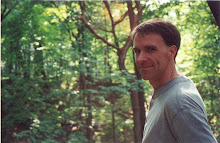[The New Arabica] [Little Italy's Church: Holy Rosary]
However, a couple of doors down the used bookstore  was still in business. Suzanne, the erstwhile manager, even recognized me as "the guy from Chicago" though I hadn't visited Cleveland in five years. When I mentioned Arabica's demise, she deadpanned, "If you have a good landlord who's committed to the community, things'll work out. But if you get someone who's just lookin' to make a buck, it usually doesn't. Things change," she shrugged, "a city is organic."
was still in business. Suzanne, the erstwhile manager, even recognized me as "the guy from Chicago" though I hadn't visited Cleveland in five years. When I mentioned Arabica's demise, she deadpanned, "If you have a good landlord who's committed to the community, things'll work out. But if you get someone who's just lookin' to make a buck, it usually doesn't. Things change," she shrugged, "a city is organic."
 Halfway up the hill, one storefront screen door was propped open, inviting people into the Little Italy Historical Museum. Inside, I found two little old ladies sitting behind a card table, yelling out about the exhibits that the festival-goers had wandered in to see and hawking the pamphlet "A History of Little Italy 1880-1982."
Halfway up the hill, one storefront screen door was propped open, inviting people into the Little Italy Historical Museum. Inside, I found two little old ladies sitting behind a card table, yelling out about the exhibits that the festival-goers had wandered in to see and hawking the pamphlet "A History of Little Italy 1880-1982."
"That woman wasn't looking for you, was she?" one of the two asked me. "She was looking for her husband."
"I'm not married," I said, "but maybe she's looking for me."
We laughed, but then, like a good Sicilian matchmaker, she said, "If she can't find her husband, maybe she should be with you instead. Let me offer to find out."
"I don't want to go making trouble," I explained. "I came actually to ask people who live in Cleveland whether they feel isolated."
"No," she said shortly. (I decided to call her Maria.) "This neighborhood is the one that has the most sense of community. It's got its ups and downs, but we manage to hold our own. We have a lot of geriatric people now. Lately people are coming to invest in real estate for the good old houses. Everybody wants to come here. There's a mystique to this area."
"There's the diversity of the whole city right outside. A few years ago, some of these types would have been run out of the neighborhood. I mean, we don't have any problems down here, you know. For the festival, they like to come down here."
Her sidekick ("Lucia" in my mind) finally chimed in. "Even when there's not the festival, there's a lot of people at the restaurants sitting outside. An event like this," she continued, "is great because people will walk in who normally wouldn't. They feel safe. They normally just come for the restaurants. We started our museum when the neighborhood began to change back in the sixties."
"And we decided," Maria added, "that, if we were going to survive, we were going to have to come together as a group for the group. You know, strength in numbers. That's about twenty-eight years ago. Then we decided, 'Why don't we do a museum?' I was born and raised in this neighborhood. Seventy-two years here. Moved here when I was two years old."
"Wow. From Italy?" I wondered.
"No, Toledo. My parents come from Italy."
20090212
152 Cleveland, OH: Assumptions
Subscribe to:
Post Comments (Atom)




No comments:
Post a Comment